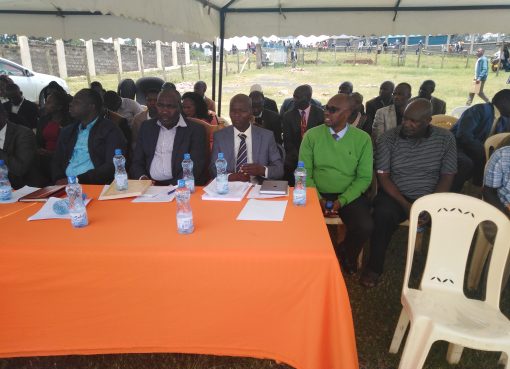The menacing cases of cattle theft and banditry attacks in Kaplelartet ward of Sigowet/Soin Constituency in Kericho County may soon be a thing of the past courtesy of an initiative geared towards transforming former bandits.
The region is known as a hotbed of producing stock theft warriors and its story is changing.
More than thirty-reformed stock theft warriors from the area have vowed to drop the culture and start different ways which will not harm anyone but rather bring change to the region.
They have decided to reform and venture into farming.
Such an activity is a peace initiative that has targeted warriors who were involved in dreaded stock theft.
The program has so far seen a drastic reduction of cases of cattle raids in the area, which borders Kericho and Kisumu Counties at Sondu town.
Sondu is a small border town between Kisumu and Kericho counties.

It borders Homa Bay County to the south and Nyamira county to the South East with river Sondu-Miriu acting as a boundary to the south.
In an interview with KNA at Tabaita village in Kaplelartet Location, the chairman of Kalyet Youth Group established in 2014 under the umbrella of Tabaita Community Based Organisation ( TACBO) John Chirchir now a reformed bandit now in his early 30s, had to face harsh reality.
Having lost many of his gang members, Chirchir reveals he engaged in cattle theft for close to 15 years and resolved to quit after witnessing many of his gang members being killed and others burnt to death during the deadly raids, while admitting their cruel deaths changed him.
After dropping out of primary school in class seven due to lack of school fees and poverty at home, the reformed warrior opted to steal cattle at a tender age of 16 years.
Today he has nothing to show for in the face of the fact that he engaged in cattle rustling for almost 15 years.
The reformed cattle rustler who was known as ‘Band Moja’ due to his prowess in cattle stealing says what triggers them to raid other communities was poverty and hunger.

“Armed with bows and arrows and machetes my gang would stay in the bushy and forest terrain seen in the area for a week before we conducted a raid in a group of four men in Nyakach and Katitu and stay with the animals for a month before we sold them in Kipsitet and Kiptere markets.
“The cash we got after selling a cow was between Shs 10,000 to Shs 12,000 and would be all gone in two days then we regroup again and start raiding for more cows. I decided to change in 2014 on realizing I had nothing to show for in my life. I have lost all my friends to this,” he said.
He adds to say that the area that has a poor road network and harsh terrain coupled with the fact that the area is humid, in most occasions driving away the stolen cattle to their hideouts in the nightfall proves easy.
The reformed bandit adds that, an elaborate oath taking is done to ensure if any of them was arrested they would remain tight lipped not to disclose their sources of stolen livestock.
Kalyet Youth Group Chair calls upon the government to use them to preach peace since they know their colleagues who are still carrying out the heinous acts.
He urges his colleagues who are still raiding to join them and stop the retrogressive culture that will not help in any way.
In the same breath, he urges the community to embrace education since it is the key to ending cattle theft and banditry in the region.
Chirchir states that the group now has a membership of close to 40 men who were once engaged in stock theft.

When Lily Chepkurui, 42, a member of Kalyet youth group married her husband Musa Langat 19 years ago,he was a cattle rustler.
Chepkirui, the mother of eight says her husband ceased stealing cattle when she threatened to leave him for good.
“I got married to my husband when I was 20 years and I found him fully occupied in cattle rustling. I did not like after two years in my marriage and I told him that I would leave him if he did not stop. There is a lot of work one can do to earn a living other than engaging in stealing cattle, which is not only dangerous but also illegal. We are happy that we are at peace knowing what we do for a living is right and decent.” she said.
When KNA visited their home, it was a sight to behold. The couple has dug a borehole in their homestead, which they use to irrigate their vegetable crops in addition to having a tree nursery and vegetables that Chepkurui sells to her neighbours and at the Sondu market.
Langat runs a food kiosk and is grateful to his wife for her resourcefulness.
The former bandits now have one battle to win, a battle against poverty and hunger.
Tabaita Community Based Organization Chairman Moses Misik reveals that the group established in 2014 has reformed the 40 former warriors by training them on life and entrepreneurship skills to help manage small business that they are planning to establish with the help of interested partners.
This is in view of giving them an alternative source of income that will completely disengage them from the temptation of falling back to stealing cattle.
Most of the reformed warriors engage themselves in small scale farming as means of livelihood.

Misik who doubles up as the Sigowet/ Soin sub-county peace committee chairman adds that there is a good working relationship between the community based organization and the youth group.
‘It is very easy to reform a convict behind bars than to reform a free man,’ Misik said.
“In 2007 and 2008 peace was disrupted in this area which contributed to increases in cattle theft. The youths who went to raid in Nyakach would disrupt peace.
“After this, we sat down and decided to get a committee of 14 people from this area and 14 from Nyanza. We continued with peace meetings from both sides and sensitized wananchi on the need to have peace and as such, we have seen an impact such that during last electioneering period there was peace. We sat down with the youths engaged in cattle rustling, some of them responded. Some of them have reformed; the challenge that we have is alternative engagements so that they can desist from going back to cattle rustling.” he said.
He revealed that they work together with the administration and law enforcers.
“The area is highly peaceful as compared to all other years during the electioneering period where the area would be very volatile and through the groups initiatives, the border has witnessed a reduction of stock theft by over 80 percent and the recovery process where out of every three cattle stolen two are recovered,” added Misik.
The CEO of Tabaita Community Based Organization Mr. Andrew Mutai noted that there was tremendous reformation witnessed among the reformed youths from the time they decided to stop cattle theft.
He goes on to state that despite the reformed youths being mocked by their counterparts still engaged in cattle theft in the area, the youths have vowed never to go back to their once retrogressive way of earning a livelihood.
By Sarah Njagi.





